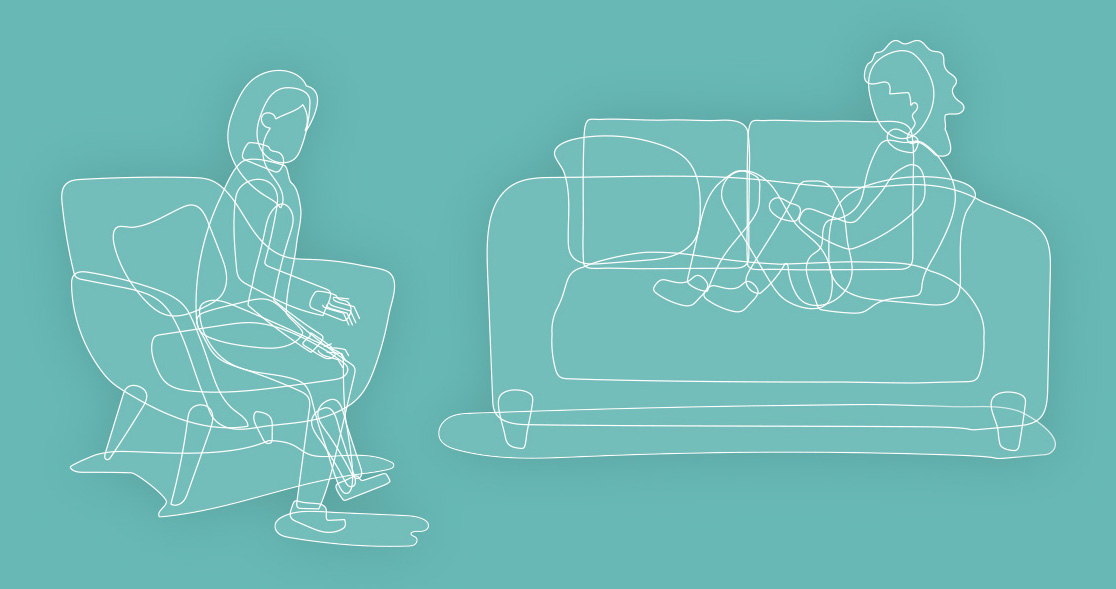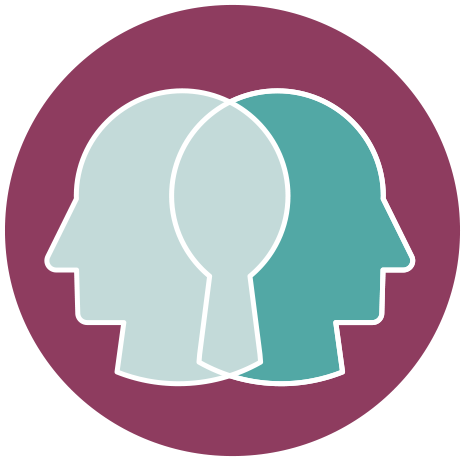Mindful Matters provides Psychotherapy and Counselling Services in Cork City led by Claudine Nelan, accredited and experienced counsellor and psychotherapist.
Counselling & Psychotherapy - Cork
What is the difference between Counselling and Psychotherapy?
This is a tricky one, in the sense that the two terms are often used interchangeably. From my perspective, I tend to distinguish between counselling as being a focused effort towards a specific, short-term issue, and therapy as involving a broader approach to the individual’s “self.” We do much more counselling than therapy.
They are both a process of changing awareness and behaviour. As a humanistic therapist I focus on the quality of the relationship between us, you the client and me, fostering a supportive environment in which you can become more intimate with your thoughts, feelings and ways of relating to yourself and others. The confidential setting of the therapy session will provide a safe space where you can explore present difficulties, perhaps discovering how your past experience affects how you interpret and manage your present reality. You will be encouraged to draw on your own strengths and resources in finding new creative solutions to these difficulties.
By learning new skills and more effective ways of dealing with problems you may be able to cope better with life events and to pursue those goals which seem good and desirable to you.
It is my hope that you will find the experience of therapy both positive and rewarding.
“The curious paradox is that when I accept myself just as I am, then I can change.” – Carl Rogers
Ways of working
A wide range of therapeutic approaches exist that inform the work of psychotherapists. Some clients find it helpful to understand what these approaches and ways of working are. The following is a brief overview of each of the main approaches that I draw on in my work.

Humanistic Therapy
Humanistic Integrative Therapy can be traced back to the 1950s and is influenced by the work of Carl Rogers and Abraham Maslow. They wanted to move away from the constraints of Behaviourist theory and set about introducing a more holistic kind of psychology. All humanistic therapists, whatever their discipline believe that the person is unique, that they consist of an integrated whole (mind, body, psyche & feelings) of which harmony and balance is integral, and that each person has the right to autonomy* and respect. Therefore the responsibility for the individual’s life lies with the individual themselves. Individual’s make their own choices and are responsible for both their action and inaction. The therapist sees the person as dynamic and as an entity unfolding in different stages.
The conditions (being genuine, empathetic, non-judgmental and providing unconditional positive regard) that the therapist creates within the therapeutic space and within the therapeutic relationship are essential for the clients’ growth and for realising their potential through self-actualisation**. A client must feel compassionately understood, and have a strong sense of freedom to be able to express themselves openly and safely within the therapeutic space.
Rather than focusing on diagnosing their clients and probing them with questions, the humanistic therapist instead focuses on understanding things through active exploration of the clients experience. They seek to understand how life is distinctively experienced by each individual client, and the unique meaning a client places on their experiences. It is the client who is most familiar with their pain and difficulties, and therefore it is the client who holds the greatest knowledge and ability to discover their way forward. The contract therefore between client and therapist is one between equals and is not about an ‘all knowing’ therapist who will ‘fix’ the client. It’s based on the premise that therapy clients – rather than the therapist – are the expert in their own lives. Humanistic Therapists don’t attempt to give clients advice or offer solutions. Instead, they take a non-directive stance, allowing the client to steer the process and find his or her own solutions thereby helping them learn to trust themselves in finding their own way in life.
Humanistic therapists also take into consideration the impact of the external world upon the internal world of the client to explore the significance of social, cultural and political realms of experience. So while the goal of the integrative approach is to nurture wholeness so that the quality of the individual’s functioning in life is maximised the therapist holds due regard for each individual’s personal limitations and possible external constraints.
The humanistic integrative approach includes a range of different therapeutic approaches such as client-centred therapy, gestalt therapy and existential therapy.
*Autonomy – the ability to make your own decisions without being controlled by anyone else.
**Self-actualisation – the achievement of one’s full potential through creativity, independence, spontaneity and a grasp of the real world.

ACT
“Running away from any problem only increases the distance from the solution. The easiest way to escape from the problem is to solve it”
Acceptance and Commitment Therapy typically pronounced as the word “act”, is an empirically supported mindfulness-based therapy that has been shown to be effective in dealing with a variety of conditions including stress, depression, and anxiety. Developed by Steven C. Hayes, ACT, along with Compassion Focused Therapy, is one of a number of ‘third wave’ behaviour therapies borne from the need to improve and complement first wave therapies such as Cognitive Behavioural Therapy (CBT).
Understanding what we can change, and what we can’t, is fundamental to achieving good mental health. ACT gets its name from its core messages: to mindfully accept what is out of our personal control (such as emotions or psychological experiences), while at the same time proactively committing to action in problematic areas of our lives where we actually have control. Through ACT clients learn to stop avoiding, denying, and struggling with their inner emotions and, instead, accept that these deeper feelings are appropriate responses to certain situations which should not prevent them from moving forward in their lives.
The core conception of ACT is that psychological suffering is usually caused by avoiding experiences and getting caught up in thinking which results in psychological rigidity that leads to a failure to take needed behavioural steps in accord with core values. In the case of ACT, you are committing to facing the problem head-on. Instead of avoiding your problems, you commit to actions that will help you stop struggling against the inevitable and facilitate thriving instead; thereby developing greater psychological flexibility.
ACT does this by:
1: Teaching you psychological skills (known as mindfulness skills) to deal with challenging thoughts and feelings effectively – in such a way that they impact and influence you less.
2: Helping you clarify what is truly important and meaningful to you – i.e. your values – and how to use that knowledge to guide, inspire and motivate positive life changes.
Using mindfulness techniques, your therapist can work with you to help you to learn new ways of dealing with feelings and thoughts, specifically about traumatic events, problematic relationships, physical limitations, or other issues, that trouble you. You will learn to see and acknowledge these thoughts and feelings, while also learning how to live with them. The aim is not to completely eliminate all negative thoughts and feelings, but to find a way to accept and manage them as an unavoidable aspect of life.
Acceptance, in this context, is a necessary precursor to change. For example, a lot of people say things like, “I would really like to change things in my life, but I am afraid of how difficult it is going to be.” An ACT approach changes this statement to the much more manageable, “Although I am afraid of how difficult it might be, I am going to change things in my life.” In this way, by acknowledging the fear, and accepting it, they become enabled to move on.
Your therapist will also work with you to help you figure out what really matters to you – what your core values and interests are. With this information, it will be easier for you to find the inspiration, motivation and guidance that you need.
ACT commonly employs six core processes to help clients develop psychological flexibility:
- Acceptance
- Cognitive Defusion
- Being Present
- Self as Context
- Values
- Committed Action
These core processes show that ACT is not all that different from other behavioral-based therapies, but the emphasis on acceptance and allowing instead of avoiding is what separates ACT from many other forms of therapy.
ACT is effective for a wide range of psychological disorders (see below), but it is also effective as a life-affirming and inspirational perspective on the world.
- exam anxiety
- social anxiety
- workplace stress
- OCD
- depression
- chronic pain
- substance abuse
- feeling stuck ‘in a rut’
It’s always hard to know how many sessions it will take. A good rule of thumb is to commit to six sessions, and then on session six, we’ll take stock, see how you’re going, and see if you need any more. If you find that you don’t need that many sessions, that’s fine too. Also, we have to be realistic; no therapy works for everyone, so if this approach doesn’t seem right for you, or you’re not happy with the way it’s progressing, it is possible to switch to a humanistic non-directive approach.

CFT
Developed by Prof. Paul Gilbert, Compassion-focused therapy is a form of psychotherapy that integrates techniques from cognitive behavioural therapy (CBT) with concepts from evolutionary, developmental and social psychology, Buddhist philosophy and neuroscience. It has proven to be especially useful for individuals who suffer from self-criticism, shame and anxiety. it is seen as a ‘third wave’ therapy by practitioners in the CBT field, together with Acceptance and Commitment Therapy (ACT).
As an approach to alleviate suffering it focuses on developing self-compassion as well as compassion for others (both believed by many to be an essential aspect of well-being) through a range of experiential methods. Learning how to feel kinder towards yourself and others can help you feel safe and capable in a world that can seem overwhelming.
The central therapeutic technique of CFT is compassionate mind training which teaches the skills and attributes of compassion.
The CFT model proposes three systems (from the evolutionary perspective) humans use to manage their emotional states:
1. Threat system – motivation is to simply survive, attention is threat-focused, driven by fear, anxiety, thoughts of danger, and the fight or flight system.
2. Drive system – motivation is to achieve/win, attention is given to goals and finding the advantage; it is concerned with motivation, arousal, and focus.
3. Care-giving system – motivation is to look after or soothe, attention is on empathy to other’s distress or pain; it is concerned with caring, soothing, safety, and calm.
Gilbert (2010) believes that the mind is organised in such a way that some mentalities or systems can be neglected while others flourish or take control, and on the flipside, improving one system or making new links can have a significant impact on others. Therefore the threat system may flourish in dysfunctional families, problematic relationships and some work environments while the care-giving system is neglected.
Treatment sessions highlight the association between these systems and human thought and behaviour; assisting clients to see with more clarity how their minds work thereby normalising painful parts of the human experience. We see that we are all born with each system in place, ready to go, but our environment affects whether we develop, use, and maintain the non-survival based systems (drive and care-giving).
The goal of CFT is to help individuals develop their care-giving (compassionate) system through learning and practising skills to develop the care-giving system, which helps them to be at peace with their thoughts and comfortable in their own head.
Rather than being a soft option, the deliberate activation of our care-giving system can generate the courage and psychological flexibility we need to face life’s challenges, and step forward into lives of meaning, purpose and vitality.
Compassion-focused therapy helps anyone who struggles with the following issues:
- deep feelings of shame
- an inner critic
- a history of emotional or physical abuse including neglect and bullying
- an inability to feel kind towards themselves
- find it hard to trust others
- self-esteem issues
- severe and chronic depression
- anxiety and/or panic attacks
- eating disorders
If you are interested in learning more about how CFT therapy works please check out the links below:
www.youtube.com/watch?v=4kF7FRy0_xs
www.youtube.com/watch?v=Mq7grBNc550
www.youtube.com/watch?v=rLJ7hGdQdnU

FAQs
This is a tricky one, in the sense that the two terms are often used interchangeably. From my perspective, I tend to distinguish between counselling as being a focused effort towards a specific, short-term issue, and therapy as involving a broader approach to the individual’s “self.” We do much more counselling than therapy.
Therapy gives the person the opportunity to explore thoughts and feelings in a supportive and confidential relationship. Often, this is the first time the person has spoken about what most deeply troubles them. Simply talking about a problem can provide relief; lending support to the description of therapy as ‘the talking cure’. It is part of our humanity to air our troubles with a trusted confidant, to gain hope and a fresh perspective on our predicament with a view to changing our lives for the better.
There are many reasons why people come to therapy; generally they come because something is not working in their lives. They may feel stuck or feel that they can’t go on and wish to talk in confidence with someone. Sometimes people come because they are in crisis as something unexpected has happened such as a relationship breakup, work change or/and the onset of panic attacks. Sometimes it is to deal with long-standing issues such as anxiety or depression. Other times they come to talk things out, to get greater clarity if they are struggling with a decision or simply to help them with their personal exploration and growth. Working with a therapist can help provide insight, support and new strategies for all types of life challenges.
Generally, the sessions involve you and your therapist exploring what is creating difficulty for you in your life. You choose what and how much you would like to say. The conversations are confidential. The therapist is there to support you and help you reach clarity and understanding and a way through your difficulties. Normally sessions are one hour in length.
Fees are:
Individual – €60.00 – Individual Sessions last sixty minutes.
Couples – €90.00 – Couple sessions last ninety minutes.
Family – €90.00 – Family sessions last ninety minutes
A small number of concessionary places are available at a reduced fee for those who cannot afford the full fee. The fee is discussed and agreed when you call to make an appointment.
The ideal is that you meet with your therapist once a week. This helps the continuity of the work and allows time in between the sessions to process the material covered. If a person wants to attend more frequently for additional support, this is possible. Once therapy has finished clients often return for ‘check-in’ or ‘support’ sessions.
The period over which a person attends therapy varies and depends on what they are attending for. It can vary from a few weeks to several months or even longer. Most people find the changes they experience in their life deepen with the length of time they spend in therapy. However, it is always the person’s choice about whether they wish to continue and how long they wish to spend in therapy. You may feel better quicker than expected or you may find you want to invest more time in exploring issues that are important to you. This is something that is considered and discussed with the therapist. A minimum of eight sessions is recommended.
The first stage is to get in touch with brief details of what you are looking for and, if it’s comfortable, what is troubling you. If you email, I will write back and probably suggest an initial, confidential chat on the telephone. There is no charge for this initial conversation. It will be a short conversation, where we can discuss whether my practice is a good fit for your needs. In most cases, this call leads to a face to face meeting within a few days.
Time has been specifically reserved for your appointment. Please be advised that a cancellation period of at least 24 hours is required. This is so that people on the waiting list may be accommodated. If you fail to show up for a scheduled appointment or are unable to give 24 hours notice, a cancellation fee will be charged. Naturally, this does not apply in the case of a late cancellation due to an emergency
At present psychotherapy services are covered by some of the major health insurance providers in Ireland. To be certain, please check your mental health benefits or contact your insurer to verify if they cover the type of therapy you are seeking.
I am a professionally qualified psychotherapist trained to work with adults and adolescents. During my five year training, I worked in charitable institutions where I gained extensive experience with a wide variety of people.
I completed a Diploma in Psychotherapy and a BSc Psychology in 2012. Since then, I have worked in private practice and abide by best practice standards; my work is supervised and insured. I am an accredited member of the Irish Association of Counselling and Psychotherapy (IACP), the Association for Contextual Behavioural Science (ACBS) and a member of the Psychological Association of Ireland (PSI).
It is crucial to work with a therapist you are comfortable with and who seems trustworthy and professional to you. It is worth visiting, or at least having telephone conversations with, a few therapists before deciding which one to hire. You can find a list of qualified and conveniently located counsellors and psychotherapists via the IACP website.
I try to accommodate your schedule by offering some evening hours and weekend hours in addition to normal business hours. Sessions are by appointment only.
Unfortunately, not at this time.
No, not necessarily but your G.P or Psychiatrist may refer you onto a Psychotherapist when they feel you would benefit from it. On the other hand you do not have to be attending a G.P or Psychiatrist when you decide to begin therapy as a Psychotherapist can usually be contacted directly for an appointment.
The simple answer is you can talk about anything you like. The session is your designated time. You are not going to be forced into talking about something you do not want to talk about or are not ready to talk about. You can talk about the past, present, or the future.
A person does not have to have a mental illness or specific problem to attend psychotherapy. However therapy can be very useful in the treatment of those who suffer with depression, anxiety, or phobias for example. Psychotherapists also work with people who have moderate to severe mental illness such as bipolar disorder and schizophrenia. Often people with more serious conditions attend a psychiatrist also.









